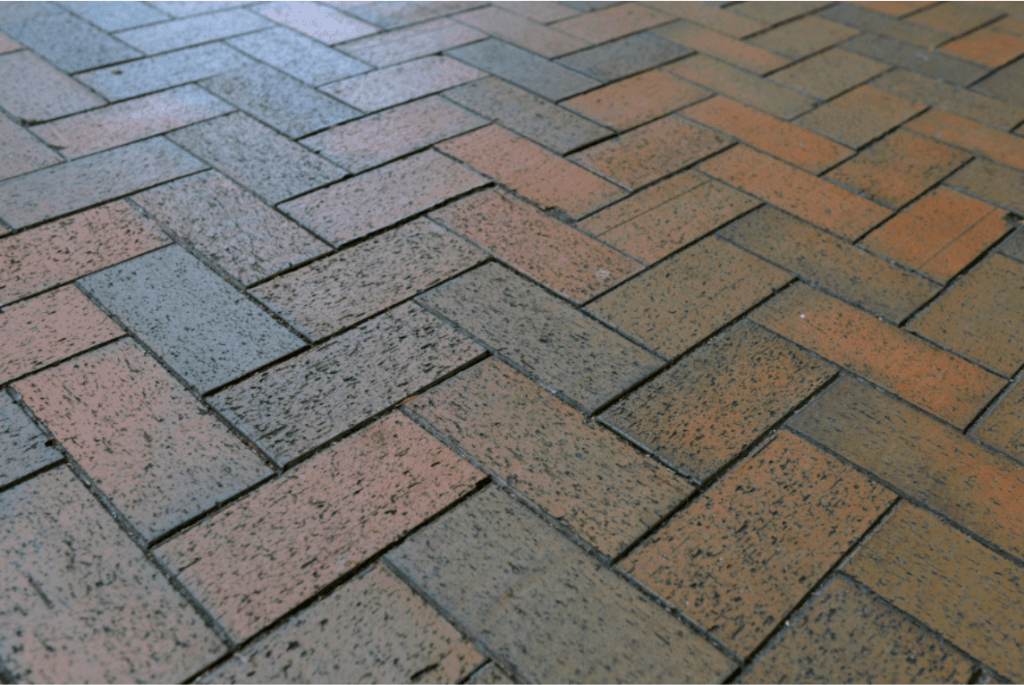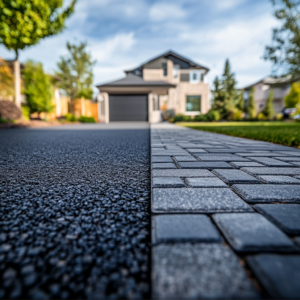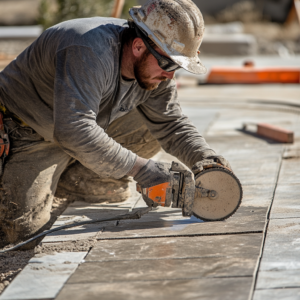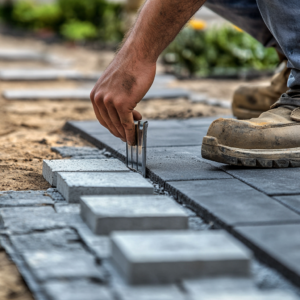Bricks have been a standard building material since 4000 b.C.. They are used for building walls and paving surfaces for roads, pathways, and even courtyards. Brick pavers are probably the number one choice when it comes to cover house entrances, pathways and driveways. But, one of the main questions asked, when people consider this material, is: “what are bricks pavers made of?”.
In this article, you are gonna find that out for sure, also, we will throw in some advantages and disadvantages of brick paver, and talk about installation and maintenance.

Jump to:
What are brick pavers made of?
A brick is a type of block used in masonry construction. The term indicates a block composed of dried clay, but nowadays, is also used informally to denote other construction blocks.
Brick pavers are a manufactured product made of clay in the shape of a rectangle. The origin of the clay determines their color, which ranges from light orange to dark brown.
In contrast to the brick used for wall construction, paver bricks are solid, smooth-surfaced without holes or gaps. A paver is solid, making it stronger, and it is designed to lay flat on the ground.
Bricks are eco-friendly products
Yes, that’s right! Brick pavers are made of Clay! Which is a natural material and it can be reused.
“Used bricks” are harvested from building demolition. They are extensively used on certain project styles and can be perfect for people who are looking for a beautiful blend of subtle color variations on their patio or driveway.
Advantages and disadvantages
Now that you know what brick pavers are made of, it’s time to check the advantages and disadvantages of choosing this type of material:
Advantages
- Cost-benefit: Initially, they can cost more than other materials to install, but afterward, maintaining them will cost way less.
- Color retention: Bricks are naturally colored, so they retain color better, particularly, when exposed to UV rays.
- Last longer: While the surface on concrete can erode and fade over time, bricks last for generations!
- Lower Maintenance: Clay bricks require less maintenance and cleaning.
- Style: Bricks have a distinct edge in style. An aged, worn brick walkway retains its charm even if it’s cracked.
- It’s a green product: As previously said, brick pavers are made of clay (a natural material), they are frequently salvaged, cleaned, and reused, which makes them a more sustainable choice.
Disadvantages
- Higher Cost: Brick pavers can be more expensive than concrete pavers.
- Limited choices of color and shape: Bricks are colored with natural clays and they are often shaped as rectangles.
- More work to install: Bricks are harder to cut and they can vary slightly in their dimensions, making them a little trickier to install.
Installation
Brick pavers can be set in a base of sand or mortar and the key to a good brick paver surface is a well-prepared base, especially if you are paving a surface that must support a lot of weight (a driveway, for example).
The installation usually begins with the perimeter bricks, which are, sometimes, set in concrete to establish a solid edging that will hold the bricks. As the field bricks are installed, they are periodically flattened and settled with a mallet or other tools.
After finishing this process, the brick surface is flattened and leveled with a heavy roller, then the cracks between bricks are filled with loose sand or mortar. People usually go with the sand-setting for environmental reasons, since it allows the water to seep into the ground.
Maintenance and cleaning
Now that you know how a brick paving is installed, it’s time to learn how to maintain and clean them.
In comparison with concrete, brick pavers will last longer, but that doesn’t mean a little bit of effort is not necessary to keep them clean and beautiful. Brick pavers gradually weather over time, that’s why proper maintenance can greatly extend their life.
Brick pavers shall be washed once or twice a year with a pressure washer. After the surface is fully dry, fill and pack the joints with fresh sand, if it is a loose-fit surface. If the pavers are mortared, repair any cracks with fresh mortar and let it dry.
To assure a long life of the paving, the bricks can be sealed after each wash and seal the sand joints as well helps to solidify the sand and prevents weeds from appearing between the bricks. To finish, it’s recommended to use a product designed especially for clay bricks to protect without changing their appearance.
So, are brick pavers the right choice for me?
The answer is: It depends!
What is Your budget and where you want to use them will help you decide which type to buy. Brick pavers can be the right choice if you are looking for a classic style and if you have the budget (or the skills) to install and preserve them.
If you live in Florida, get in touch with us, we will give you a free estimate at your place.



